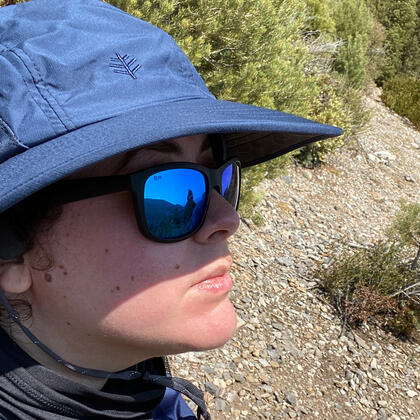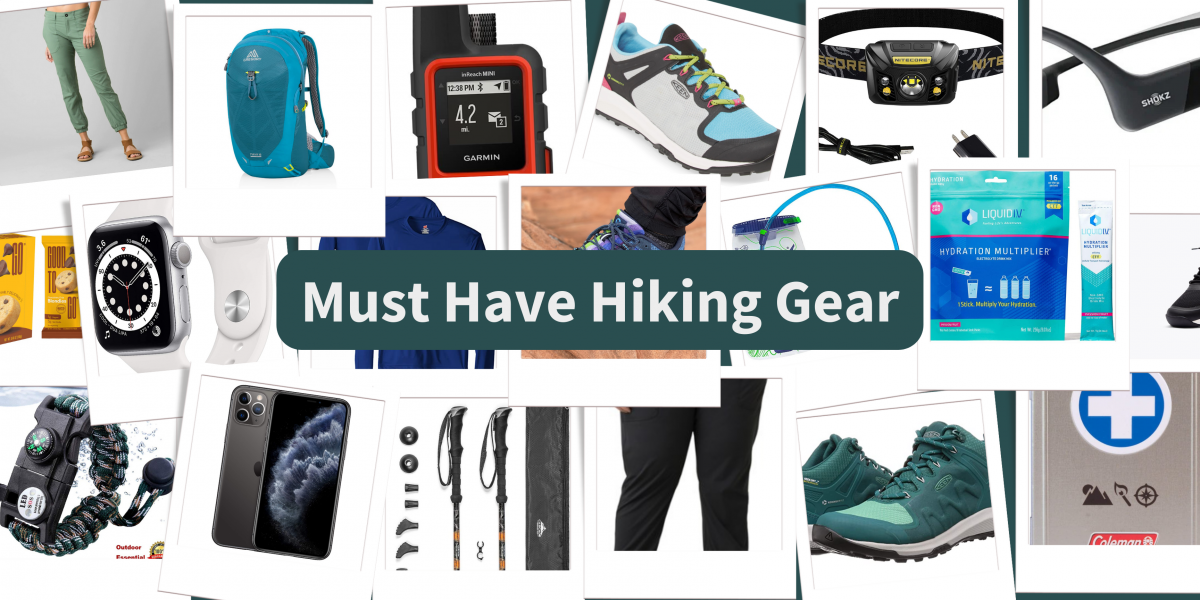As an indoorsy person, my main concern when doing outdoorsy things is being prepared. Without a lot of experience, being prepared is the best way to ensure I’ll be safe, comfortable, and enjoy my time.
Hiking is a great way to get exercise, enjoy the outdoors, and explore new places. But before you hit the trail, it's important to make sure you have the right gear. Here are the top 10 essentials for a great hike.
- Shoes: A good pair of hiking boots or sneakers will provide support and protection for your feet and ankles. Look for ones that are comfortable and well-ventilated, with good traction. I prefer hiking sneakers for quick hikes or flat terrain. I wear boots if the trail is rough or steep to protect my ankles. Avoid fully waterproof boots if you will be hiking in a dry place. They can get your feet super hot!
TLDR - If you want one pair of do-it-all hiking shoes, go with sneakers. If you want versatility, get sneakers and boots. For maximum situational coverage, get sneakers, boots, and an additional fully waterproof set.
Recommendations: Merrell Antora Sneakers, Salomon Speed Cross Sneakers - Clothing: Hiking clothes should be comfortable and durable, and they should protect you from the sun and insects. Choose lightweight, quick-drying fabrics whenever possible. I recommend wearing long sleeves and long pants to avoid sunburn, bug bites, and ticks.
Recommendations: Hanes Cool Dri SPF Tees, Eddie Bauer Leggings - Backpack & hydration pack: A good hiking backpack can make or break your trip. Take something too big on a short hike and you’ll be miserable. Take something too small on a long hike and you’ll wish you had more space. Choose a backpack that is the right size for your needs, and that is comfortable to wear. Make sure your backpack has room for a hydration pack. NEVER go into the outdoors without enough water. I have three sizes of backpacks: fanny pack for very short hikes, small for medium hikes, and regular sized for longer hikes.
Recommendations: Down Shift Waist Pack, Gregory Maya Backpack - Hat: A hiking hat will protect you from the sun and keep you cool. Choose a hat that is made from a breathable material, such as cotton or nylon. I never go hiking without a hat or visor.
Recommendations: Mission Cooling Hat, Coolibar Explorer Hat - Sunscreen: Sunscreen is essential for protecting your skin from the sun's harmful rays. Choose a sunscreen with an SPF of 30 or higher, and reapply it every two hours. I usually use spray sunscreen before I put my hiking clothes on, and then use a solid stick sunscreen to reapply on the trail.
Recommendations: Sunbum Original SPF 70, Blue Lizard Mineral Sunscreen Stick - First aid kit: A first aid kit is essential for treating minor injuries on the trail. Make sure your first-aid kit includes bandages, antiseptic wipes, pain relievers, and other essential supplies. I have a large first aid kit that I keep in my car, a smaller one that I put in my backpack, and a mini one that I take for short hikes.
Recommendations: Adventure Medical Kits, Coleman Mini First Aid Kit - Food & electrolytes: Hiking can be strenuous, so you'll need to eat plenty of energy-rich foods. Choose foods that are lightweight and easy to eat, such as trail mix, energy bars, and fruit. I also like to bring electrolyte replenishers with me when I hike, like LiquidIV packs or energy chew gummies. These items can literally be life savers.
Recommendations: LiquidIV Hydration Multiplier, Skratch Energy Chews - SOS Device: Most outdoor trails do not have phone service. If you plan to go on a long hike where getting lost is a possibility, make sure that you bring a safety device with you just in case. Newer iPhones have SOS capabilities built in, so if you have one, you’re probably all set. I also own a Garmin InReach Mini, which is a satellite-based SOS device. I’ve never had to use it, but I would not want to need it and not have it.
Recommendations: iPhone 14, Garmin InReach Mini - Headlamp: A headlamp is essential for hiking in the dark. Choose a light that is bright enough to see where you're going, and that has a long battery life. I also recommend headlamps that have various light modes, like red light, so that you don’t blind yourself in the dark.
Recommendations: EverBrite Headlamp - Hiking poles: These look like a gimmick, but when you need stability, you’re going downhill, or you have bad knees/ankles, they can make your hike ten times more bearable. They usually come in sets of two, but you can just bring one if you want to save space.
Recommendations: Trekology Hiking Poles
With the right gear, you can go on safe and enjoyable hikes that will encourage you to keep getting out there and discovering new things.
Until next time. Happy exploring!
-Zuly

